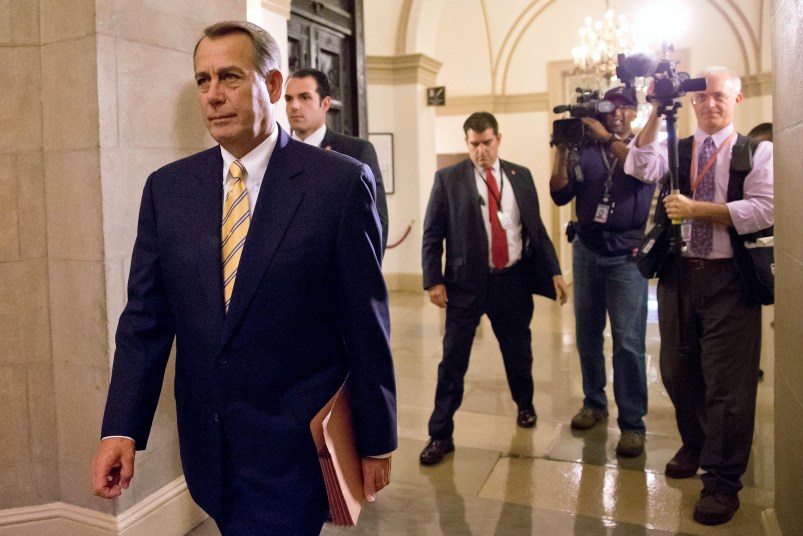Update: 6:25 P.M.
House Republicans failed to settle on a plan to avert default and re-open the shuttered government after multiple attempts crashed at the hands of conservatives, bringing the U.S. within 30 hours of breaching the debt limit deadline.
The plan stumbled within an hour of Boehner’s spokesman Michael Steel assuring reporters that “the House will vote tonight” on what was the second version that leadership had put together on Tuesday.
Conservatives scuttled it, again, and Democrats vowed to vote against it unanimously. A Rules Committee meeting aimed at fast-tracking the bill to the floor was abruptly postponed — indefinitely. Republicans conceded that the vote was probably not going to happen.
“My guess is there will not be a vote [tonight],” Rep. Joe Barton (R-TX) said on CNN.
So, what’s next? “No decision has been made at this time,” said a House Republican leadership aide. “The elected leadership will meet soon.”
The revised proposal would have raised the borrowing limit through Feb. 7, fund the federal government through Dec. 15 and rescind health insurance subsidies for members of Congress, the White House and their respective staff members.
Democrats have vigorously objected to the latter provision, which has strong GOP support due to misconceptions about an alleged Obamacare “exemption” for Congress. In reality, Obamacare forces all members and staff to buy insurance on the exchanges and affords them financial assistance, just as the vast majority of U.S. workers get through their employers. The Republican amendment would strip away that employer contribution.
“After listening to Members at Conference this morning,” Steel said initially, before the plan was scuttled, “House Republican Leaders will bring a plan to the floor which will end the ObamaCare subsidies for elected officials and staff in Washington, DC, and pressure Senate Democrats to accept more sensible dates for the CR and the debt limit.”
The second House GOP plan Tuesday excluded provisions in an emerging Senate deal aimed at placating both parties, such as a union-backed delay in an Obamacare reinsurance fee and income verification for those seeking subsidies to buy insurance on the law’s marketplaces.
It’s far from clear a debt limit hike can pass Congress by the Thursday debt limit deadline, given the differences between the two chambers. But passage through the House would have sped up any bill in the Senate, which could consider the measure “privileged” and bypass potential efforts by conservative senators to stall and delay.
Shortly after the proposal was unveiled, Heritage Action and FreedomWorks, the deep-pocketed groups that carry significant sway with conservatives, came out against it and announced that they would downgrade lawmakers who voted for it.
“Americans are clamoring for a way out of Obamacare, not another Washington-style punt,” Heritage Action said in a statement.
“When we demanded that Congress treat everyone equally under the law, that didn’t mean Congress should make everyone equally miserable under a bad law,” said FreedomWorks CEO Matt Kibbe. “Why not work to improve the quality of life for all Americans by at minimum delaying the individual mandate for a year?”






